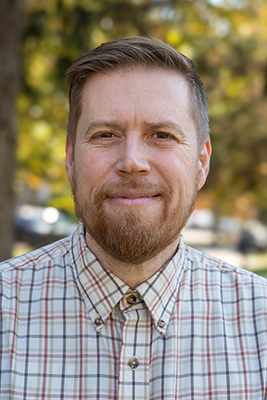Faculty Profile
Lars English
Professor of Physics (2003)Contact Information
on sabbatical Spring 2026
Tome Scientific Building
717-254-8925
http://www.larsenglish.com
Bio
Dr. English has published around 50 peer-reviewed research articles exploring “the nonlinear dynamics of complex systems.” His research interests broadly fall within the field of nonlinear and statistical physics. In recent years, topics have included: Intrinsic localized modes, solitons and skyrmions in nonlinear lattices; compact localized states and flat-band physics; spontaneous synchronization of oscillator arrays; instability and pattern formation; bifurcations, symmetry breaking and self-organization. He has studied (both experimentally and numerically) systems as varied as: nonlinear electrical transmission lines, chains of coupled pendula , networks of neuronal oscillators, spin lattices, and networks of electrical self-oscillators. In all of these systems, nonlinearity and lattice/network geometry play important roles, as they enable and guide processes of patterns formation. Broadly speaking, the aim is to experimentally characterize emergent patterns, study their onset and boundaries in parameter space, and to formulate mathematical models which allow a numerical and/or analytical exploration. Ideas from the field of dynamical systems (such as fixed points, stability, bifurcation, hysteresis, chaos) are essential in this endeavor. Other interests include the Calculus of Variations, magnetism and spin resonance, microwave spectroscopy, medical imagining techniques, and issues within the philosophy of science.
Education
- B.S., Denison University, 1996
- M.S., Cornell University, 1999
- Ph.D., 2003
2025-2026 Academic Year
Fall 2025
PHYS 161 Intro to Scientific Comp/Vis
This one-credit course will introduce students to basic ideas and methods of scientific computing using a Python-based programming language. No prior knowledge of computer programming is required. Examples will draw heavily from classical mechanics, so some prior familiarity with introductory physics (or concurrent enrollment in PHYS 131) will be helpful, but is not required. Topics range from projectile motion to planetary orbits, from collisions and scattering to oscillations. Other scientific explorations will be guided by student interest.
PHYS 212 Intro Relativistic/Quant Phys
Completion of both PHYS 211 and PHYS 212 fulfills the WID Requirement.
PHYS 311 Dynamics & Chaos
An advanced treatment of classical mechanics using vector calculus and the calculus of variations, as well as an introduction to the analysis of chaotic systems. Topics will include: the dynamics of systems of particles and conservation laws; linear and nonlinear oscillators; iterative maps and the route to chaos; central force motion; rigid body motion; non-inertial reference frames and fictitious forces; Lagrangian and Hamiltonian formulations of dynamics. The course will also focus heavily on analytical and problem-solving techniques. Prerequisite: 211 and 282 or permission of the instructor.
